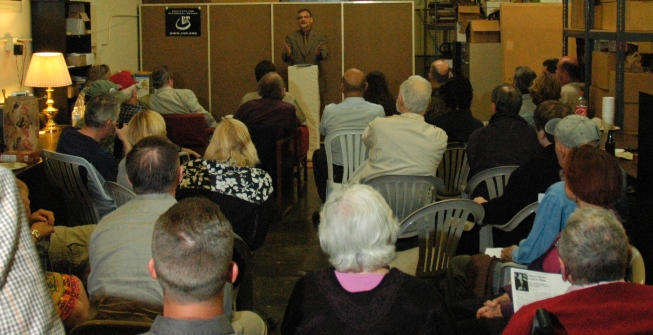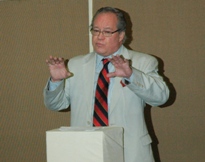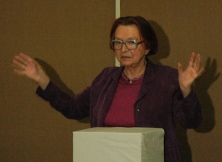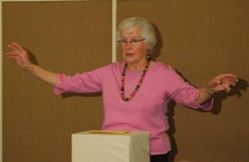Life and Death in Wartime Europe and The Battle for Internet Free Speech
Engaging Talks Highlight IHR Meeting
News from the Institute for Historical Review
Life and death during World War II in Poland and Germany, and the battle for Internet free speech, were the topics tackled by the three featured speakers at a packed IHR meeting on Saturday evening, April 17, 2010, at the Institute’s offices in southern California.
Paul Fromm, director of the Canadian Association for Free Expression (CAFE), reviewed major assaults against on-line freedom of expression, and recent legal victories against the groups and individuals who seek to impose “politically correct” censorship on the Internet.
In his introduction of the speaker, IHR director Mark Weber praised Fromm for his record of dedicated and effective activism. Over the years, he noted, Fromm has addressed IHR meetings in California and northern Virginia, and Weber has spoken at CAFE meetings in Canada.
|
|
|
|
The legal weapon used to silence on-line dissidents in Canada is Section 13(1) of the country’s “Human Rights Act,” which forbids any Internet or telephonic communication “that is likely to expose a person or persons to hatred or contempt by reason of the fact that that person or those persons are identifiable on the basis of a prohibited ground for discrimination,” that is, by race, ethnicity, religion, and so forth. Remarkably, Fromm stressed, truth is no defense in Section 13(1) cases. This strange law forbids even truthful statements if they are “likely” to foster contempt of persons who belong to the legally privileged minority groups.
On the basis of this law, Fromm said, Jewish-Zionist groups sought to censor the US-based “Zundelsite,” and to ban dissident writings by Weber and others posted on the website. The case came before hearings in Toronto of the Human Rights Tribunal, in which Fromm and CAFE defended free expression as an “intervenor.” In those hearings, Weber testified on two occasions — in December 1998 and again in October 2000 — on behalf of Zundel and Internet free speech. (See “Before the ‘Human Rights Tribunal’ in Canada.” https://ihr.org/journal/v19n5p-2_Weber.html)
Canada’s mainstream media largely ignored that important legal battle because it had no sympathy for Zundel. But as Fromm explained, the same issues and arguments proved to be very relevant after Muslims brought a complaint in December 2007 under Section 13(1) against Maclean’s, an influential and widely read magazine, for writings by conservative commentator Mark Steyn and others that allegedly encouraged contempt or hatred of Muslims. Because the victim in this case was a leading magazine, and not the “marginalized” Zundel, newspapers and commentators across Canada spoke out against this assault against freedom of expression. The complaint against Maclean’s was eventually dismissed.
An even more significant victory came in the case of Marc Lemire, who runs the “Freedomsite” website. After a six-year legal battle, Lemire won a breakthrough victory in September 2009 when the Canadian Human Rights Tribunal ruled that Section 13(1) violates free expression rights laid out in the country’s Charter of Rights. In the Maclean’s case as well as in the Lemire battle, Fromm pointed out, the Tribunal belatedly accepted points and arguments that he and other free speech activists had presented years earlier in the “Zundelsite” case.
These days, said Fromm, a pressing threat to freedom — both in the US and in Canada — comes from hotels and other private businesses that do not permit meetings of dissident groups. During the past year more hotels have refused to make facilities available to non-conformist groups, giving in to threats and intimidation by bigots, or because they don’t want social embarrassment or lost business as a result of hostile media coverage.
The next speaker, Dana Alvi, spoke graphically of privation, hunger, suffering and death in Poland during the final months of World War II, and in aftermath of the conflict. She recounted numerous moving personal anecdotes, including grim memories from the bloody Warsaw Rising of 1944, when she was a twelve year old. As a girl in Warsaw, she related, she had the job of deliberately misleading policemen after killings by the Polish Underground of Germans who had helped to kill or torture Poles.

Mark Weber addresses the meeting
In his introduction of her, Weber pointed out that the US media and American classrooms have devoted vastly more attention to the Warsaw Ghetto uprising of 1943 than to the much larger Warsaw Rising of 1944. About 750 Jewish fighters were involved in the 1943 action, whereas some 40,000 Polish fighters took part in the 1944 uprising.
Even the Germans who put down the uprising, Weber noted, were impressed with the heroism and fighting spirit of the Poles. In that regard, he cited remarks of Reich minister Dr. Goebbels, and quoted from letters by a young German officer who witnessed the emotionally moving surrender of the 9,000 surviving Poles who gave up after 63 days of fierce combat. Even the official German newsreel report on the conclusion of the uprising conveyed the unbroken pride and noble bearing of the Polish fighters.
The evening’s final address was by Gretel Hines, who was a US citizen in Germany during World War II, and who later worked for years as a high school teacher in Los Angeles. She began by telling how angry she sometimes feels because the ordeals and sufferings of Germans during that terrible conflict are almost entirely ignored in the United States. Her father had migrated from Europe to California in the mid-1920s, but after marriage and Gretel’s birth, they moved back to Germany in 1938. During the years that she and her family lived in Munich, 1939-1941, Gretel was eight to ten years old.
In her well-organized and well-delivered presentation, which was packed with striking anecdotes and observations, she spoke about day-to-day life in the Third Reich, including playtime activities, food, wartime rationing, school life, movies, activities as a “Hitler Youth” member, and radio broadcasts.
One of the most memorable days of her life, she related, was in June 1940 when she and a girl-friend saw Hitler, who was visiting Munich for talks with the Italian leader, Mussolini. It was only after making their way among large crowds, and several delays, that the two girls finally saw the German leader in person. She recalled how impressed she was by the way he reached out to personally thank some women Red Cross workers.
In 1941 she moved with her parents and siblings to a small town in the beautiful Sudetenland region, where they lived until the end of the war. Conditions worsened dramatically during the final months of the conflict, she related, as Allied forces advanced from both East and West.
She recalled the devastating British-American fire bombing of Dresden, which was about 60 kilometers north of their home. With feelings of fear and horror, she saw great fires from the city that lit up the sky. She also told of shootings of civilians by low-flying American war planes, and of the widespread sense of despair and hopelessness when the war ended.
Some neighbors took their lives during that terrible time, she related, and many more Germans suffered mistreatment at the hands of vengeful Czechs who were the new masters in the region. There was also a severe food shortage, she said, and meals “alternated between boiled potatoes with mustard sauce or boiled potatoes with onion sauce.”
The fact that she and her father were US citizens now proved very useful. A home-made American flag, which they displayed from their house, along with some official papers, secured marginally better treatment for their family. Then, with help from friends in the US, they were eventually able to make their way back to California.
Rounding out the meeting was a short talk by a local businessman who praised the greater frequency of IHR meetings and the good quality of presentations at these gatherings. He concluded by stressing the importance of fellowship, and urged everyone to foster a stronger sense of compassion and community.


